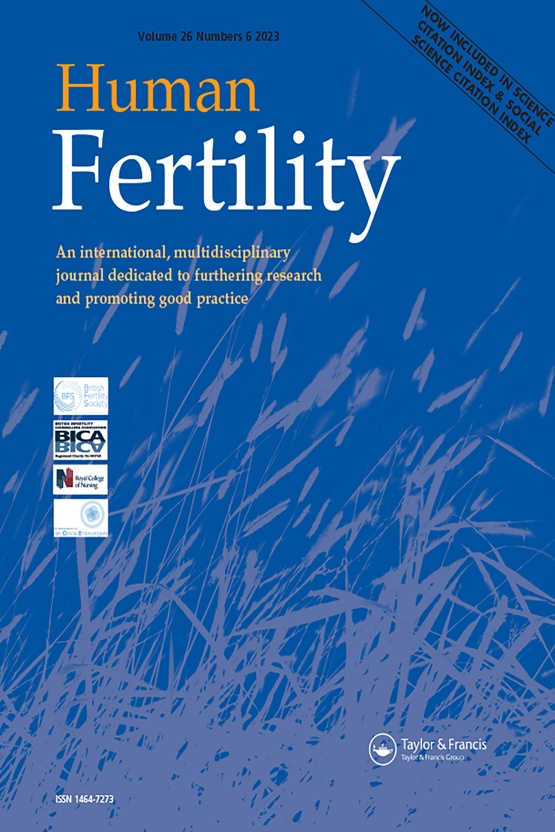Submit a Manuscript to the Journal
Human Fertility
For an Article Collection on
Reproductive Aging: Population Trends in Human Fertility
Manuscript deadline
30 November 2024


Article collection guest advisor(s)
Dr. Zhongwei Huang,
National University Health System, Department of Obstetrics and Gynecology, Division of Reproductive Endocrinology and Infertility; NUS Bia-Echo Asia Center for Reproductive Longevity and Equality
[email protected]
Reproductive Aging: Population Trends in Human Fertility
Reproductive aging signifies the decline in fertility over time, beginning at puberty and steeply ending at menopause in women, with men showing gradual fertility decline as they age. For the last 70 years, fertility rates have decreased worldwide with a staggering 50% decline, as reported by The World Economic Forum. Without including migration, a population should ideally have a total fertility rate (TFR) of 2.1 to keep its population stable. However, in 2020 the global TFR was recorded as 2.3. Countries with the lowest TFR in 2022 include mega-cities in Asia such as South Korea (0.84), Singapore (1.05) and Taiwan (TFR 1.07), with similar trends observed globally.
Secular trends of decreasing fertility rates worldwide are due to the rising living costs, delayed childbearing, and a general shift in life priorities. Remaining involuntarily childless and the overestimation of ART success are also other contributing factors to the decreasing TFR. This is worsened by the irrevocable loss of ovarian function in women due to reproductive aging, leading to a steep decline in female fertility. The consequence is a rapidly aging society with a concomitant imbalance with the working force and non-working groups.
The aim of this Article Collection is to highlight global fertility trends and reproductive outcomes in various populations as well as health consequences to both women and men due to the influence of ethnicity and reproductive aging.
We envision the Collection to showcase regional and international trends of human fertility and reproductive outcomes as well as the crucial factors encompassing this topic. In addition, the Collection will address the topic of reproductive aging and its biological consequences in addition to the impact of ethnicity and genetics on human fertility to facilitate innovative solutions in the hope of averting fertility decline in ageing populations globally.
Subtopics:
- Ethnicity and genetics
- Reproductive aging in world populations
The preferred article types are research papers, review articles, policy/practice reports, article commentaries, and meeting reports, which are all aligned with the journal’s accepted article types.
Adjunct Assistant Professor Zhongwei Huang is Deputy Director of the NUS Bia-Echo Asia Centre for Reproductive Longevity & Equality, Yong Loo Lin School of Medicine, National University of Singapore. He concurrently serves as a consultant at the Division of Reproductive Endocrinology and Infertility, Department of Obstetrics and Gynecology, National University Hospital, Singapore. Dr. Huang’s subspecialties include reproductive endocrinology and infertility and sexual medicine, and he is accredited by the Ministry of Health (Singapore) as an assisted reproductive techniques (ART) specialist. Dr. Huang completed his PhD on ovarian biology in 2011 at the University of Oxford, United Kingdom, and continues to contribute to the field as a clinician-scientist. His current research focuses on discovering innovative solutions through basic and translational research to change women’s life narratives of reproductive inevitability to reproductive longevity. Dr. Huang’s research has been published in renowned journals such as Cell Research, Nature Communications, Human Reproduction, Fertility & Sterility, Molecular Human Reproduction, Reproductive Sciences and Clinical Endocrinology.
Disclosure Statement: Dr. Huang declares no conflict of interest regarding this work.
Benefits of publishing open access within Taylor & Francis
Global marketing and publicity, ensuring your research reaches the people you want it to.
Article Collections bring together the latest research on hot topics from influential researchers across the globe.
Rigorous peer review for every open access article.
Rapid online publication allowing you to share your work quickly.
Looking to Publish your Research?
Find out how to publish your research open access with Taylor & Francis Group.
Choose open accessSubmission Instructions
All manuscripts submitted to this Article Collection will undergo desk assessment and peer-review as part of our standard editorial process. Guest Advisors for this collection will not be involved in peer-reviewing manuscripts unless they are an existing member of the Editorial Board. Please review the journal Aims and Scope and author submission instructions prior to submitting a manuscript.